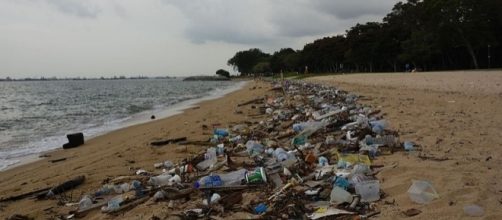Caroline Power is a photographer who specializes in underwater photography. During one of her jaunts, she has captured images of tons of Plastic and styrofoam wastes floating around a number of islands in the Caribbean Sea. These consist of various types of plastic items that have been discarded after use, and include items like spoons, forks, bottles etcetera.
Bits and pieces of these plastics are mistaken as food by the marine animals, and they choke on these substances. This is another form of pollution and an example of degradation of the environment. The issue must be addressed by all of us in order to maintain the health of the world.
How to control such pollution
New Zealand Herald reports that once the unwanted plastics land up in the ocean, their removal is not only difficult but costly as well. Therefore, efforts must be taken to prevent their entry into the ocean. A three-pronged attack can help the cause. There must be a focus on a better waste management system, followed by creating an awareness about the environment in the people, and setting up proper recycling facilities for the plastics.
The scenario in the Caribbean Sea, as recorded by Caroline Power, paints a grim picture. Her team came across plastic and Styrofoam wastes near the most pristine dive sites in the Caribbean. The trash consisted of not only plastic bags of various sizes but also other types of bags made from non-biodegradable material.
These can be mistaken as edible matter by the sea creatures and, hence, is a matter of concern for all those who want a healthy environment devoid of the evils of pollution from unwanted wastes.
Plastic pollution is everybody’s problem
There are many organizations who are devoted to raising awareness among the people regarding the hazards of pollution from plastics and non-biodegradable material like Styrofoam. Restrictions have been imposed on plastic bags based on their thickness, and efforts have been initiated to prevent littering due to discarded water bottles and bottles of cold drinks by offering money in exchange of return of empty bottles.
These are issues that have a direct bearing on the well-being of the environment, and the Caribbean Sea experience highlights the need to have stricter policing to keep our surroundings free from pollutants.
Items like plastic knives, forks, plates, and glasses are convenient. These have become indispensable in the modern day, but care must be taken to ensure that these items of convenience do not become items with health related issues.


